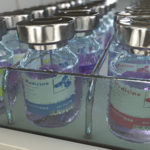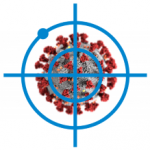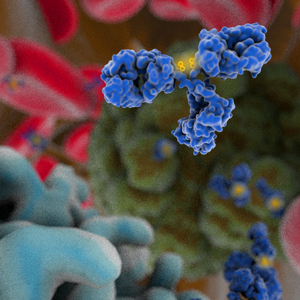 On August 14, 2020, the US Food and Drug Administration approved satralizumab-mwge (ENSPRYNG) for the treatment of neuromyelitis optica spectrum disorder (NMOSD) in adult patients who are anti-aquaporin-4 (AQP4) antibody positive. NMOSD is a rare autoimmune disorder of the central nervous system that primarily damages the optic nerve(s) and spinal cord, causing blindness, muscle weakness and paralysis. ENSPRYNG was previously approved in Canada, Japan and Switzerland. Applications are under review with other regulatory agencies, including in the European Union and China.
On August 14, 2020, the US Food and Drug Administration approved satralizumab-mwge (ENSPRYNG) for the treatment of neuromyelitis optica spectrum disorder (NMOSD) in adult patients who are anti-aquaporin-4 (AQP4) antibody positive. NMOSD is a rare autoimmune disorder of the central nervous system that primarily damages the optic nerve(s) and spinal cord, causing blindness, muscle weakness and paralysis. ENSPRYNG was previously approved in Canada, Japan and Switzerland. Applications are under review with other regulatory agencies, including in the European Union and China.
ENSPRYNG is a recombinant humanized IgG2 antibody targeting interleukin-6 (IL-6) receptor. The efficacy of ENSPRYNG for the treatment of NMOSD in adult patients was established in two studies. SAkuraStar (NCT02073279) was a randomized (2:1), placebo-controlled trial in 95 patients without concurrent immunosuppressive therapy (IST) in which 64 patients were anti-AQP4 antibody positive and 31 patients were anti-AQP4 antibody negative. SAkuraSky (NCT02028884) was a randomized (1:1), placebo-controlled trial in 76 adult patients with concurrent IST. Of these, 52 adult patients were anti-AQP4 antibody positive and 24 adult patients were anti-AQP4 antibody negative. In the SAkuraStar monotherapy study’s AQP4 antibody positive subgroup, 76.5% of Enspryng-treated patients were relapse-free at 96 weeks, compared to 41.1% with placebo. In the SAkuraSky study, which evaluated Enspryng when used concurrently with baseline IST, 91.1% of Enspryng-treated AQP4 antibody positive subgroup patients were relapse-free at 96 weeks, compared to 56.8% with placebo. Based on results of the clinical studies, the recommended loading dosage of ENSPRYNG for the first three administrations is 120 mg by subcutaneous injection at Weeks 0, 2, and 4, followed by a maintenance dosage of 120 mg every 4 weeks.
Satralizumab-mwge is the 8th antibody therapeutic to be granted a first approval in the US or EU in 2020.
The Antibody Society maintains a comprehensive table of approved monoclonal antibody therapeutics and those in regulatory review in the EU or US. The table, which is located in the Web Resources section of the Society’s website, can be downloaded in Excel format. Information about other antibody therapeutics that may enter regulatory review in 2020 can be found in ‘Antibodies to watch in 2020’.




